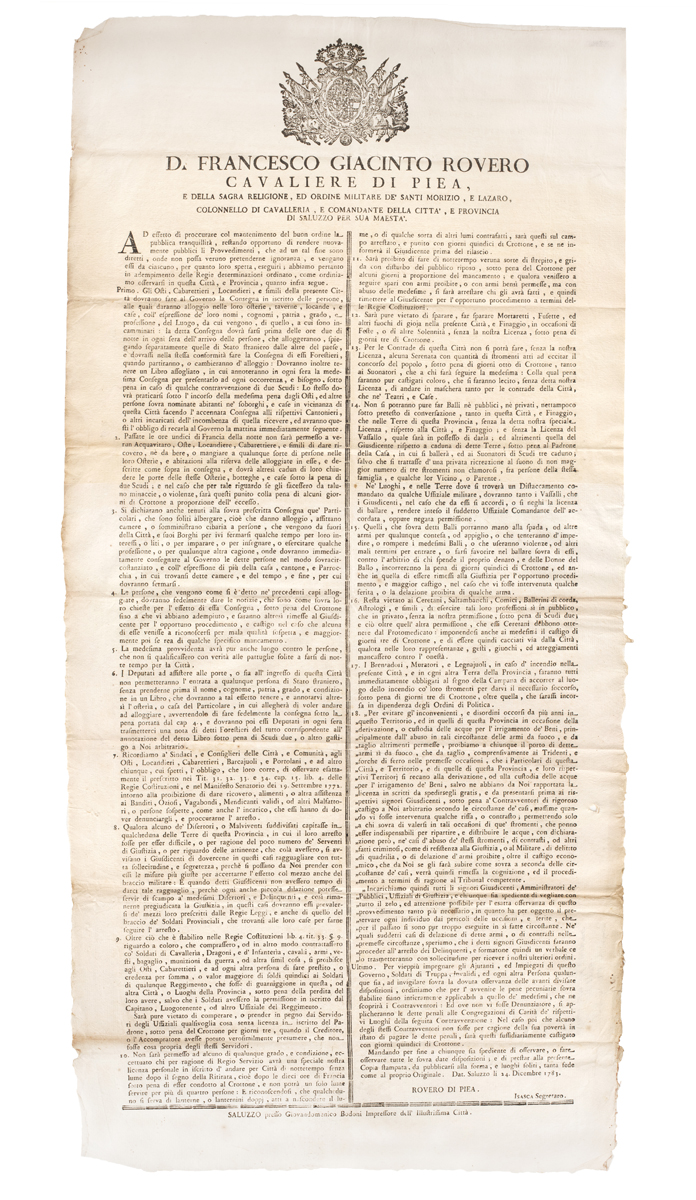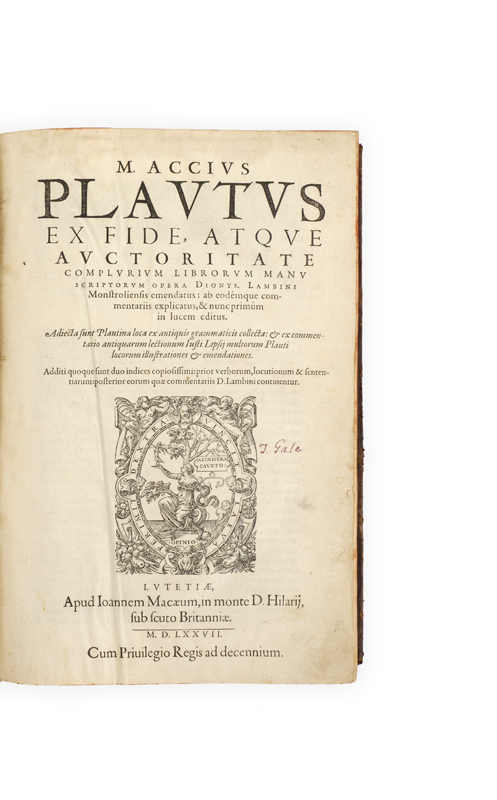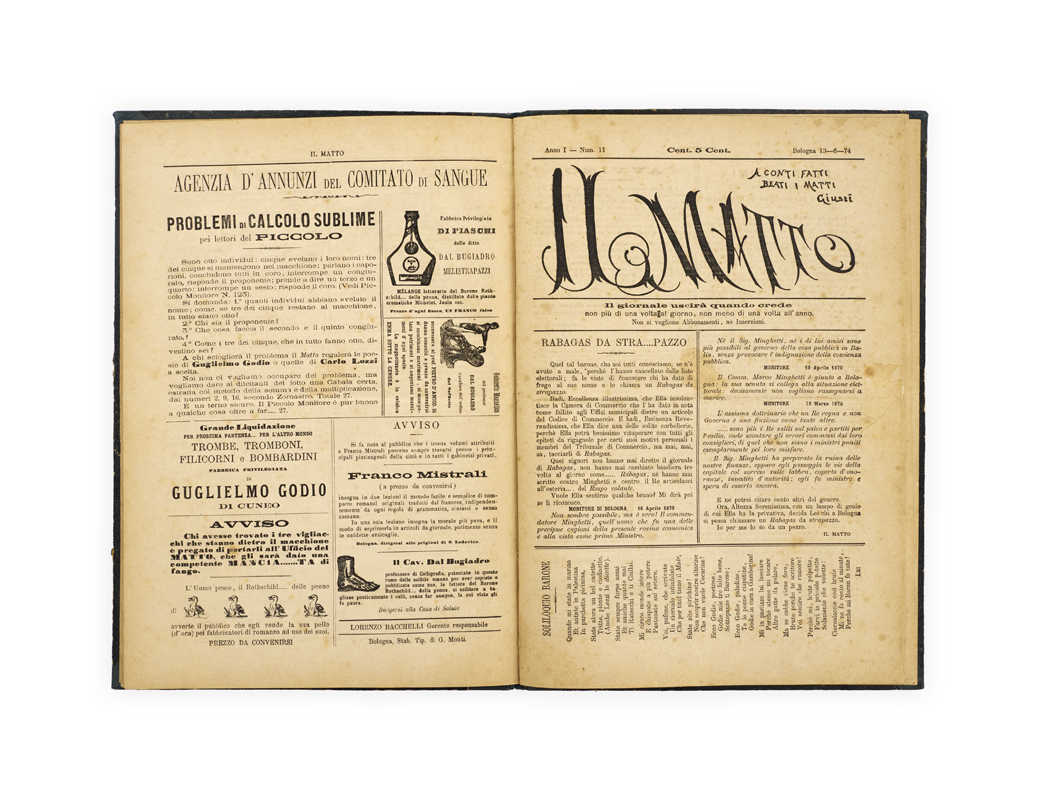
UNRECORDED SALUZZO BODONI IMPRINT
[BODONI.]
D. Francesco Giacinto Rovero Cavaliere di Piea, e della Sagra Religione, ed Ordine Militare de’ Santi Morizio, e Lazaro, Colonnello di Cavalleria, e Commandante della Città, e Provincia di Saluzzo per Sua Maestà. [Incipit:] Ad effetto di proccurare col mantenimento del buon ordine la pubblica tranquillità, restando opportuno di rendere nuovamente pubblici li Provvedimenti, che ad un tal fine sono diretti.
Saluzzo, Giovandomenico Bodoni, [December 1783].
Double-sheet broadside (720 x 346 mm), printed in two columns, woodcut arms at head, typographic borders; retaining deckle-edges; creased where once folded, small marginal paper flaw (5 mm approx.) far from text, nonetheless a very well-preserved specimen; contemporary manuscript note to verso.

Added to your basket:
D. Francesco Giacinto Rovero Cavaliere di Piea, e della Sagra Religione, ed Ordine Militare de’ Santi Morizio, e Lazaro, Colonnello di Cavalleria, e Commandante della Città, e Provincia di Saluzzo per Sua Maestà. [Incipit:] Ad effetto di proccurare col mantenimento del buon ordine la pubblica tranquillità, restando opportuno di rendere nuovamente pubblici li Provvedimenti, che ad un tal fine sono diretti.
Very rare survival, apparently unrecorded, of this bill of public order laws printed by Giovandomenico Bodoni at Saluzzo.
The name Bodoni, still a byword for classical beauty in printing, was made illustrious by Giambattista (1740–1813), who combined his family’s heritage and experience with a study of the work of John Baskerville, Pierre Simon Fournier, and Firmin Didot. His unique style earned his typefaces widespread admiration. He had been born in the principality of Saluzzo, since 1601 annexed to the Savoy possessions in Piedmont, where the family continued to print (and to serve as state printers) even after Giambattista established his own workshop in Parma under ducal patronage. The present bill was printed by Giambattista’s uncle, Giandomenico Bodoni, who had provided his nephew with his first set of types when starting his new venture in Parma twelve years earlier.
The interest of the bill, however, goes beyond the history of typography to illuminate elements of Enlightened-rule social history. Intended for public display, it details regulations for public order, ranging from injunctions for innkeepers and hoteliers to provide authorities with lists of their guests, a ban on serving drinks and food after 11pm (‘according to the French hour’), registration of all foreigners on entry at the border, the exclusion of bandits, vagrants, and ‘idle mendicants’ from hospitality settings, and forbidding pawnbrokers in Saluzzo from taking any item of military regulation uniform as collateral. Some of the most detailed rules pertain to keeping order on the streets at night: it is forbidden for citizens to walk in the streets after 10pm without carrying a light, and no-one may carry arms unless licenced. The wearing of masks and costumes is also strictly subject to licence, as is the right to hold balls and to serenade. Fortune tellers, jesters and street performers are banned. Public resources are strictly stewarded, with a ban on private appropriation of irrigation water, and an injunction to all carpenters and builders to respond to the city fire alarm bell on pain of detention. Incarceration appears to be liberally used as a deterrent in all the injunctions, none of which carry pecuniary penalties.
No copies are found in OCLC, ICCU, or Library Hub. Saluzzo Bodoni imprints of any kind are rare: beyond a group at the Bodleian, OCLC finds only four (Dartmouth, Toronto, and two at Illinois) outside Italy; of all holdings, only three are bills.

